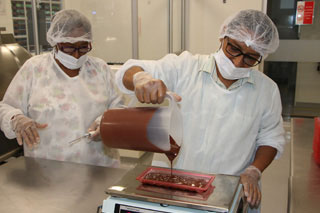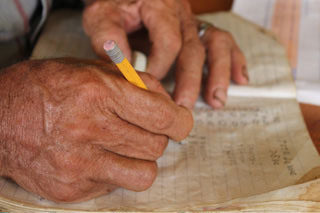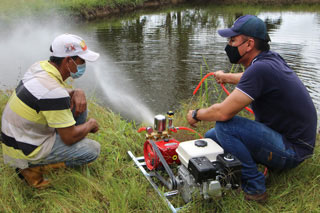Assisting Alcaraván in Colombia
By Jose Luis Gomez and Jamie McFadden
International News, July 2022

In this article, we will discuss a recently completed project in Bogotá Colombia, for Alcaraván, a nonprofit foundation.
Before retiring, I (Jamie McFadden) worked as an actuary for 35 years. This included working for large insurance companies as well as in consulting and actuarial software and modeling roles.
I have been inspired by the volunteer work of my father. He is a retired certified public accountant. For almost 30 years, since his retirement, he has been doing volunteer work though organizations funded by two United States entities: the Agency for International Development (USAID) and Farmer to Farmer (F2F).
USAID and F2F partner with non-governmental organizations (NGOs) around the world to send U.S. volunteers to work with local organizations (“hosts”) in developing countries. The volunteers use their skillsets to assist the host organizations in specific projects. The projects typically have a duration of two to three weeks. The volunteer travels to the local country and works alongside personnel from the host.
In February 2022, I completed my first project of this nature. For this project, I worked with an NGO called Partners of the Americas (POTA). As the name implies, POTA match volunteers with hosts in Central and South America.
The project was to review and assess the IFRS accounting used by the host organization Alcaraván, a Colombian private, non-profit foundation, operating in the department of Arauca, in northeastern Colombia. The foundation oversees implementing social and environmental programs that benefit rural communities in direct influence of SierraCol Energy, a Colombian oil and gas company.
These social programs fall into four categories:
- Social infrastructure, which provides housing to vulnerable families.
- Economic diversification, that focuses on developing the cocoa-chocolate value chain as well as the dairy and beef sectors.
- Human development, which builds skills and capacities in children, youngsters and adults so they are better equipped to face the challenges of the workplace; and
- Financial inclusion, which provides access to microcredits and financial education and currently serves 4,000 base-of-the pyramid entrepreneurs, 56 percent of which are women.
The foundation’s budget for 2022 totals about $10 million, of which microfinance accounts for $4.9 million.

Photo Credit: SierraCol Energy/Fundación El Alcaraván
Contributing to economic reactivation following the COVID pandemic and providing financial services to its clients are critical challenges for 2022. Alcaraván is also developing metrics and indicators to quantify the impact of social and environmental projects and financial inclusion programs in the areas of intervention.
My work experience as an actuary gave me a good foundational skillset for the project:
- My work (both software-related and in general) with insurance fixed assets had provided me with working knowledge of concepts like accrued interest, present values, amortization schedules, and the analysis and treatment of loan impairments.
- When working in investments during my career, I had started taking the Certified Financial Analyst (CFA) exams. The syllabus strongly emphasizes accounting knowledge, covering both International Financial Reporting Standards (IFRS) and US GAAP.
- More generally, as actuaries, we are used to encountering projects requiring new skillsets and knowledge bases, and I found good resources online to help me get up to speed quickly.
I prepared for the project via several Zoom calls with people from Alcaraván and Partners of the Americas. The Alcaraván accountant sent me their year-end 2020 financial statements, including the Notes to the statements, numerous supporting exhibits, and accounting policy documents.

Photo Credit: SierraCol Energy/Fundación El Alcaraván
My Spanish language skills are still only basic. I was delighted with the ease of using Google Translate for translations of both PDF and Word documents.
I spent two weeks onsite in Bogotá, the capital of Colombia, which is where the executive director and head accountant for Alcaraván are based. We held several onsite meetings to review their organization in general, as well as their accounting treatment for various items. POTA engaged an excellent translator to alleviate the language differences. The project culminated in a presentation I gave on the last day summarizing my findings.
The project findings are summarized as follows:
- IFRS ongoing education
- IFRS treatment for small companies and non-profits is governed by the IFRS for SME (Small and Medium Entities) framework.
- I discovered a great, free resource from the IFRS Foundation which contains PDFs with comprehensive treatment of each of the 35 IFRS SME sections. The documents can be easily translated into Spanish, for use of future education and training for Alcaraván’s accounting team.
- There is an ongoing project to define a worldwide IFRS accounting framework specifically for non-profits which Alcaraván plans to monitor.
- Specific recommendations on some of Alcaraván’s accounting treatment, related to depreciation of fixed assets, and the treatment of accrued interest and impairment estimates for the microfinance loan portfolio.
The project was a great experience for me. Although I did not visit Alcaraván’s home base in the department of Arauca, I was inspired by the work they are doing, particularly in Microfinance, helping entrepreneurs develop and grow their businesses. This was my first introduction to Microfinance, and I would love to extend my knowledge to Microinsurance, given my actuarial background.
Although it was my first project of this nature, I am hoping to do many more projects, as a way of using my skillsets, giving back in a small way, and continuing to assist foundations such as Alcaraván and the work that they do.

Photo Credit: SierraCol Energy/Fundación El Alcaraván
Statements of fact and opinions expressed herein are those of the individual authors and are not necessarily those of the Society of Actuaries, the editors, or the respective authors’ employers.
Jose Luis Gomez, economist and MA in Political Economy, is executive director at El Alcaravan Foundation in Bogotá and Arauca, Colombia. He can be reached at joseluis_gomez2@sierracol.com.
Jamie McFadden, FSA, is a retired actuary in Stuart, Florida. He can be reached at jpm08502@gmail.com.
